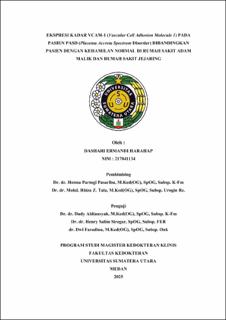Ekspresi Kadar VCAM-1 (Vascular Cell Adhesion Molecule 1) pada Pasien PASD (Placenta Accreta Spectrum Disorder) dibandingkan Pasien Dengan Kehamilan Normal Di Rumah Sakit Adam Malik Dan Rumah Sakit Jejaring
The Expression Of Vascular Cell Adhesion Molecule 1 (VCAM-1) In Placenta Accreta Spectrum Disorder (PASD) Patients: A Case-Control Study in Adam Malik General Hospital And Satellite Hospitals

Date
2025Author
Harahap, Dashari Ermandi
Advisor(s)
Pasaribu, Hotma Partogi
Tala, Mohd Rhiza Z
Metadata
Show full item recordAbstract
Introduction: Placenta accreta spectrum disorder (PASD) can cause long-term
adverse effects such as fertility problems and risk of maternal mortality during
labour. Vascular cell adhesion molecule-1 (VCAM-1) is a cell adhesion molecule
commonly found in endothelial cells, macrophage tissue, and placental
trophoblastic cells and is associated with PASD.
Methods: This study was an observational analytic study with the aim of
assessing the association of pre-natal serum VCAM-1 levels with the mean
incidence and severity of PASD at Adam Malik Hospital and University of North
Sumatra (USU) Network Hospital in Medan, Indonesia.
Results: The mean VCAM-1 level was found to be higher (p = 0.01) in the group
with PAS (398.77 ± 77.36) compared to pregnancy (293.13 ± 161.93) The mean
VCAM-1 level with the highest level was in the precreta placenta group 518.21 ±
150.70 (p = 0.007). The sensitivity and specificity values of VCAM-1 as a
predictor of PASD with a cut-off of 307 were 71% and 65.6%.
Conclusion: VCAM-1 levels can be one of the predictors of PASD in pregnant
women.
